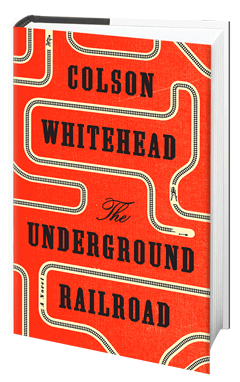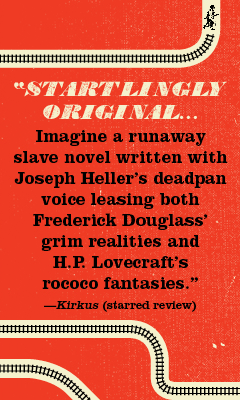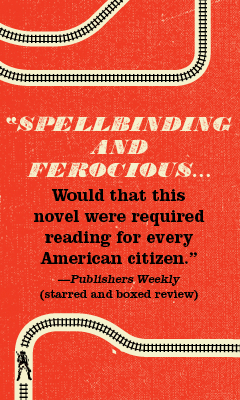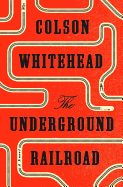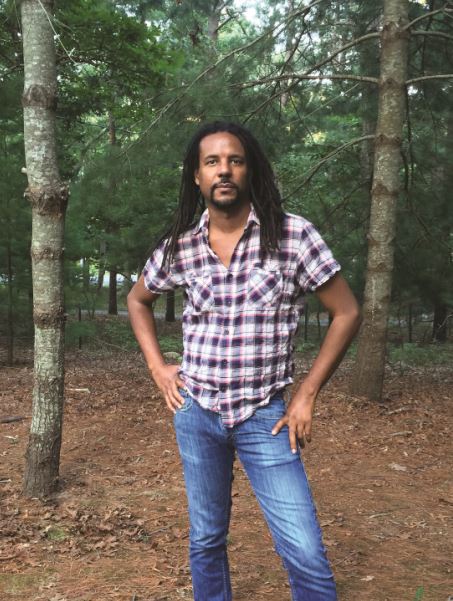The Underground Railroad
by Colson Whitehead
The Underground Railroad represents a departure for Colson Whitehead, known for his diverse body of work--novels about zombies, John Henry, the Pynchon-esque world of elevator inspectors, a memoir disguised as a meditation on poker and an unclassifiable portrait of New York City--and his dazzling, virtuosic, occasionally nigh-impenetrable prose. In The Underground Railroad, simplified, but no less beautiful, language tells the story of Cora, an outcast even among her fellow slaves--the legacy of her fugitive mother and a fierce confrontation over a garden plot lend her an unbalanced reputation--who makes a break for freedom early in the novel. Fleeing the horrors of the plantation and an almost demonically persistent slavecatcher by the name of Ridgeway, Cora is aided on multiple occasions by the Underground Railroad.
Instead of the metaphorical organization from history, Whitehead's Underground Railroad is an immense network of actual underground railways taking fugitive slaves from station to station. Whitehead writes: "Two steel rails ran the visible length of the tunnel, pinned by wooden cross-ties into the dirt. The steel ran south and north presumably, springing from some inconceivable source and shooting toward a miraculous terminus." When asked who built the railroad, a station agent simply responds, "Who builds anything in this country?" Whitehead isn't interested in the how and why so much as the concept of hopes, dreams, fears and simple imagination made manifest--it's not quite magical realism, but there are points of similarity.
This audacious fudging of history continues throughout the book and only gets increasingly phantasmagorical as the story progresses. Even Whitehead's obvious inventions are densely shaded with truth, trading in historical accuracy for a broader understanding of the dangers facing African Americans long after the unsubtle horrors of slavery had ended. Each state that Cora visits represents different variations of those dangers. In this way, her story has much in common with classic adventure narratives such as Gulliver's Travels or The Odyssey, with each state in her journey as bizarrely different as the islands Odysseus and Gulliver landed on.
In South Carolina, for example, Cora must navigate the insidious treacheries of misguided progressivism. Whitehead imports 20th-century crimes against African Americans to add to Cora's woes: references to eugenics programs, the infamous Tuskegee syphilis study, historical revisionism and the practice of debt-bondage force her to conclude that "people wore different kinds of chains across their lifetimes...." Later, she visits a North Carolina bound up in a terrifying form of racial totalitarianism and Whitehead even indulges in some biblical imagery when she is brought into the plague-ridden, fire-blasted hellscape that is Tennessee.
Unlike the Bible, however, The Underground Railroad derives no certain lessons from these incidents. Cora is left to struggle to make sense of a senseless universe without recourse to religion, her relentless pragmatism forcing her to avoid easy answers--"Initially she assigned the devastation of Tennessee--the blaze and the disease--to justice. The whites got what they deserved.... But if people received their just portion of misfortune, what had she done to bring her troubles on herself?"
While Cora is the protagonist, Whitehead makes time for digressions following Ridgeway, a grave-robbing doctor named Stevens and Cora's fellow escapee Caesar, among others. These chapters round out the supporting characters and introduce different visions of America--conflicting, frequently self-serving philosophies that seem to have persisted long after these characters' times, sometimes in mutated forms. Ridgeway, for example, espouses a cynical, might-makes-right ideology: "Here was the true Great Spirit, the divine thread connecting all human endeavor--if you can keep it, it is yours. Your property, slave or continent. The American Imperative." Georgina, a freeborn black teacher, proclaims, "The Declaration is like a map. You trust that it's right, but you only know by going out and testing it yourself." Lander, a famous black speaker, argues, "This nation shouldn't exist, if there is any justice in the world, for its foundations are murder, theft, and cruelty. Yet here we are."
Despite the countless positions espoused, Whitehead himself never seems interested in thundering declamations on the idea of America. In fact, Whitehead speaks through Lander when he has him say:
I don't have an answer for you. I don't know what we should do. That word, we. In some ways, the only thing we have in common is the color of our skin. Our ancestors came from all over the African continent. It's quite large.... We are not one people, but many different people. How can one person speak for this great, beautiful race--which is not one race but many--with a million desires and hopes and wishes for ourselves and our children?
For we are Africans in America. Something new in the history of the world, without models for what we will become."
Cora's journey differs in one major aspect from the classic adventure narratives mentioned earlier: unlike Odysseus and Gulliver, Cora has no home to return to, or even a clear destination. Her path is haphazard, strange, wandering from one temporary patch of safety to another. And yet, through it all, she maintains a measure of dignity. In the absence of a home, she seems to find a refuge in herself, in the thoughts and beliefs that no one can take from her. Cora says: "The world may be mean, but people don't have to be, not if they refuse." The strangest, wildest, most thrillingly implausible part of The Underground Railroad is not the many-miles-long underground tunnels, but the persistence of hope in the face of senseless, persistent horror. --Hank Stephenson



